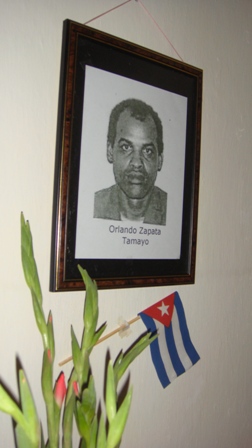
An event of such magnitude always leaves its mark. The death of Orlanado Zapata Tamayo, at the age of 42, is indelibly engraved on my memory.
In the afternoon of 23 February 2010 I was at the home of the independent lawyer and journalist Laritza Diversent, reviewing some legal cases which might be of journalistic interest.
I already knew about Zapata’s hunger strike. About the physical abuse he had suffered. About the reports that spoke of his rapidly deteriorating health, after more than 80 days without food.
My mobile phone didn’t stop ringing. On the 20th of February, three days before his death, I got a text message from another informant, letting me know that Reina Luisa Tamayo, his mother, had been summoned urgently to Section 21 of Cuban Intelligence. They wanted her to talk to her son to get him to give up the hunger strike.
The sequence of events was very rapid. That Tuesday, while I was discussing work matters with Laritza, I received a deeply moving text. It was from the blogger Claudia Cadelo. She said that at 3:27 in the afternoon, in the hospital Hermanos Ameijeiras, Orlando Zapata had died.
Laritza and I were dumbstruck. Then, everything happened very quickly, like scenes from a video clip. I tried to get a plane ticket for Banes, a town in the province of Holguín, more than 700kms from Havana.
José Martí airport appeared to be under siege. A foreign journalist told me that he had not even been able to get a ticket by bribery. Incredible for Cuba. Politely, the woman at the information desk gave out that there would be no tickets for Holguín for a week.
An airport worker called me to one side and told me in a whisper, “Brother, this is a tough one. You won’t get a ticket for a thousand dollars. Some guys from Security said that if you get on a plane, all of us who work this shift will be sacked.”
I tried to get a bus ticket, I worked out that the journey would take 14 hours, but I couldn’t manage that either. All the options were closed.
I don’t want to be self-important and imagine that Security was responsible for my not being able to get to Banes. The opposition leader Martha Beatriz Roque, and Laura Pollán one of the leading members of the Damas de Blanco, hired a car to Holguín, but when I called Martha, they had already left.
I felt beaten. As a journalist I couldn’t get the latest news out. And as a man, I wanted to be at his family’s side at that terrible time.
Walking through the city with Laritza, we met the independent journalist Jorge Olivera, one of the 75 dissidents jailed in the spring of 2003. Olivera told us stories about Zapata, they were together in some godforsaken prison, and he said that at Laura Pollán’s house, on Neptune Street, a book of condolences had been opened.
It was almost twelve midnight when we reached the house, headquarters of the Damas de Blanco. Next to a Cuban flag and a photo of Orlando, around twenty people were gathered in the small room.
There we spoke with members of the movement that Zapata belonged to. Outside the house we could see the political police.
When I arrived home at about 4 in the morning I was nearly exhausted. Before I was overtaken by sleep, I went over the notes I had taken that day about Orlando Zapata Tamayo. We had a great deal in common. Our love of baseball, and our race. I wish I had known him.
Photos: Laritza Diversent. Symbolic vigil at Laura Pollán’s house, 23rd and 24th February 2010.
Translated by: Jack Gibbard
February 24 2011
